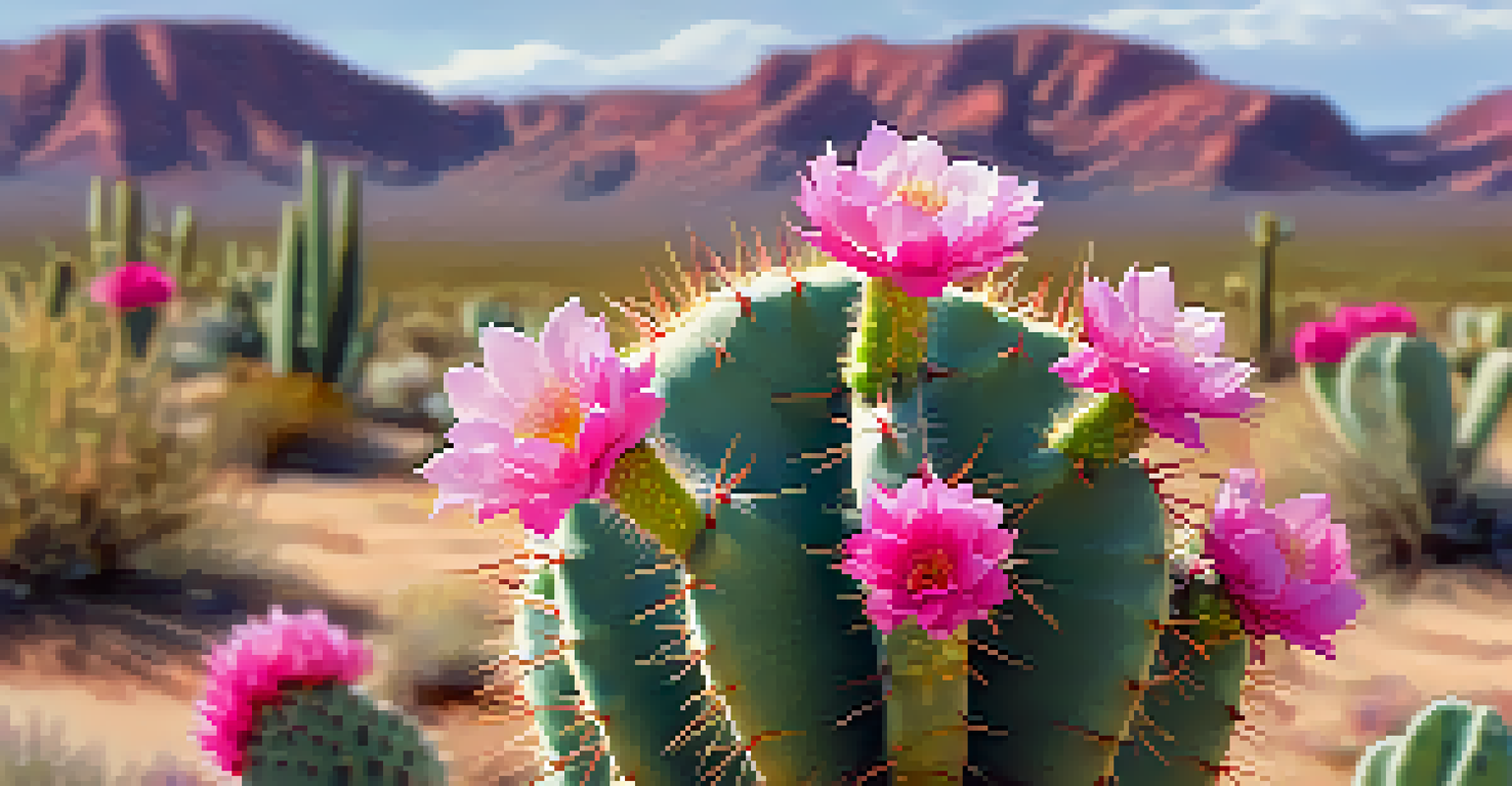Cultural Perspectives on Peyote and Connectedness

Understanding Peyote: What Is It and Its Significance?
Peyote is a small cactus known for its psychoactive properties, primarily found in the southwestern United States and Mexico. For centuries, Indigenous communities have utilized peyote in spiritual and healing ceremonies. This sacred plant holds significant cultural importance, representing a bridge between the physical and spiritual worlds.
We are all connected; to each other, to the earth, to the universe.
In many Indigenous cultures, peyote is viewed not just as a substance but as a teacher that facilitates deep introspection and connection with the universe. Its use is often tied to rituals that promote communal bonding and spiritual growth. Thus, peyote is more than a drug; it's a vital component of identity and continuity for those who partake in its use.
Understanding peyote's significance requires acknowledging the historical and ongoing challenges faced by Indigenous peoples. The connection to peyote is part of their cultural heritage, offering insights into their worldview and practices, and highlighting the importance of preserving these traditions.
Cultural Rituals: Peyote in Indigenous Ceremonies
Indigenous ceremonies involving peyote are rich in symbolism and purpose, often aimed at healing, community building, and spiritual enlightenment. For instance, the Native American Church integrates peyote into its rituals as a means to connect with the divine and seek guidance. These gatherings create a safe space for individuals to share experiences and foster a sense of belonging.

During these ceremonies, participants may engage in singing, drumming, and storytelling, all of which enhance the communal experience. The act of sharing peyote among members reinforces social bonds and creates a shared sense of purpose. This interconnectedness is vital, as it allows participants to feel supported and understood in their journeys.
Peyote's Cultural Significance
Peyote is not just a psychoactive substance; it plays a crucial role in Indigenous spiritual practices and cultural identity.
Moreover, these rituals often emphasize respect for nature and the interconnectedness of all life. By engaging with peyote, participants not only connect with each other but also with the broader ecosystem, reinforcing the idea that all living beings are part of a greater whole.
The Psychological Impact of Peyote on Connectedness
Research indicates that the psychoactive compounds in peyote can significantly alter perception and promote feelings of connectedness. Users often report profound experiences that transcend ordinary reality, leading to a greater appreciation for life and relationships. This altered state can foster empathy, understanding, and a sense of unity with others.
The greatest gift of the garden is the restoration of the five senses.
Many individuals describe a sense of oneness with nature and fellow beings while under the influence of peyote, which can lead to lasting changes in their worldview. This connection can be particularly healing for those who feel isolated or disconnected in their daily lives. By experiencing this deep sense of unity, participants often find renewed motivation to nurture their relationships.
Furthermore, the psychological benefits can extend beyond the individual, positively impacting communities. As individuals return from their experiences, they may share insights and perspectives that encourage collective healing and growth, thereby enhancing the overall sense of connectedness within their communities.
Contemporary Perspectives: Peyote in Modern Society
In recent years, there has been a growing interest in peyote beyond Indigenous communities, with some individuals seeking it for personal growth and spiritual exploration. This trend raises important questions about cultural appropriation and respect for Indigenous practices. Understanding the cultural context of peyote use is crucial for those looking to engage with it responsibly.
As conversations around mental health evolve, some advocates argue for the integration of traditional practices like peyote use in therapeutic settings. However, this must be done with cultural sensitivity and a commitment to honoring the traditions that have safeguarded this sacred plant for generations. Acknowledging the historical significance of peyote ensures that modern practices are respectful and informed.
Community and Connectedness
Peyote ceremonies foster a sense of belonging and interconnectedness, reinforcing social bonds and collective healing.
Ultimately, the contemporary perspective on peyote serves as a reminder of the delicate balance between personal exploration and cultural respect. Engaging with peyote in a meaningful way requires an understanding of its roots and the values that Indigenous peoples uphold.
Legal Challenges and the Future of Peyote Use
The legal status of peyote remains a complex issue, particularly in the United States, where it is protected for use in religious ceremonies by members of the Native American Church. However, outside of this context, the legal landscape is murky, leading to potential exploitation and misuse. This situation calls for a nuanced discussion about who can access peyote and under what circumstances.
As interest in psychedelics grows, some advocates are pushing for broader legalization of peyote for therapeutic and personal use. While this could open doors for many, it also risks commodifying a plant that holds deep spiritual significance for Indigenous peoples. The challenge lies in finding a way to honor these traditions while also considering modern perspectives on mental health and healing.
Moving forward, it is essential that any discussions about peyote use include Indigenous voices and perspectives. Their insights can guide the conversation towards respectful practices that honor the cultural heritage of peyote while exploring its potential benefits in contemporary settings.
Lessons from Indigenous Wisdom: Connectedness and Community
Indigenous teachings about connectedness often emphasize the importance of community and relationships. Peyote ceremonies serve as a powerful reminder of how collective experiences can strengthen bonds and foster a sense of belonging. This wisdom can offer valuable lessons for contemporary society, where many individuals feel isolated despite being more connected than ever through technology.
By embracing the principles of connectedness found in Indigenous cultures, individuals can cultivate deeper relationships with those around them. Whether through shared experiences, open communication, or community involvement, fostering connections can greatly enhance emotional well-being. The lessons learned from peyote practices can inspire others to seek out meaningful interactions in their daily lives.
Respecting Indigenous Traditions
As interest in peyote grows, it's vital to engage with its use responsibly, honoring its cultural roots and the values of Indigenous peoples.
Moreover, this emphasis on community can extend beyond human relationships to encompass a deeper respect for nature and the environment. Recognizing our interconnectedness with all living beings can drive positive change, encouraging individuals to act with mindfulness and responsibility towards the planet.
Conclusion: Embracing Connectedness Through Peyote
Peyote serves as a powerful symbol of connectedness that transcends cultural boundaries. By exploring its significance within Indigenous communities, we can gain insights into the importance of relationships and the shared human experience. The lessons derived from peyote practices remind us of the value of community, empathy, and understanding.
As society continues to grapple with issues of isolation and disconnection, teachings surrounding peyote can provide a pathway towards healing and unity. Whether through traditional practices or modern interpretations, embracing the spirit of connectedness can lead to a more compassionate and interconnected world.

Ultimately, the journey with peyote encourages us to reflect on our own relationships and our connection to the greater tapestry of life. By honoring these teachings, we can foster a deeper sense of belonging, both within ourselves and in the communities we inhabit.